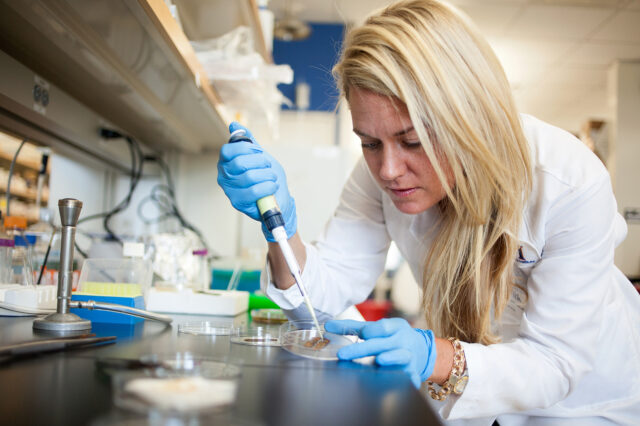University of Florida receives phase II Grand Challenges Explorations funding

A University of Florida epidemiology Ph.D. student has received nearly half a million dollars in phase II funding through Grand Challenges Explorations, an initiative created by the Bill & Melinda Gates Foundation that enables individuals worldwide to test bold ideas to address persistent health and development challenges.
Margo Klar, M.P.H., a doctoral student in the department of epidemiology at the UF College of Public Health and Health Professions and the UF College of Medicine, will use the funding to conduct feasibility testing of a ceramic umbilical cord cutting device she created for use in low-resource countries. The device does not rust, is reusable, easily sterilized and can be used safely without injury to the newborn or health care worker.
“It is my hope that the Ceramic Cord Cutting Device promotes good birthing hygiene by encouraging positive behavior change and reducing the morbidity and mortality associated with umbilical cord infection,” Klar said. “I am grateful to the Bill & Melinda Gates Foundation for working closely with our team to ensure that we have the resources necessary to be successful.”
In 2011, Klar was awarded a Grand Challenges Explorations phase I grant to develop a prototype of the Ceramic Cord Cutting Device, or C3D. The Grand Challenges Explorations program invests in the early stages of innovative ideas that have real potential to solve the problems people in the developing world face every day. Phase II funding recognizes those ideas that have made significant progress toward implementation.
Umbilical cord infection results from cord contamination during unsanitary delivery conditions, and the infection can often lead to sepsis and neonatal mortality. Currently, aid agencies distribute clean delivery kits to developing countries. The kits include a disposable razor blade or scalpel, but in environments where resources are scarce and supply chains are insufficient, these disposable blades are frequently reused. Klar knew her device needed to be affordable, stay sharp and be easily cleaned, even after multiple uses. During phase I of the project she developed the device’s design, demonstrating that it enhanced safety for the health care worker, mother and the newborn, and could be easily sterilized and reused.
In the second phase, Klar will introduce the device to birth attendants, including midwives, nurses and physicians, in seven countries in Africa and Southeast Asia. In a series of surveys, focus groups and in-depth interviews, she hopes to gain an understanding of current birthing practices and attendants’ willingness to use C3D in everyday practice. She also will seek feedback for improvements to the device’s design.
“Now that we have a working prototype, I am really excited to see how the birth attendants in low-resource environments respond, and to gauge their level of interest in adopting the C3D,” Klar said.
Klar’s UF research team includes mentor Linda B. Cottler, Ph.D., M.P.H., chairwoman of the department of epidemiology and PHHP associate dean for research and planning, Deepthi Varma, Ph.D., of the department of epidemiology, Judy Johnson, Ph.D., of the College of Medicine, Jane Houston, D.N.P., from the College of Nursing, and Peter S. McFetridge, Ph.D., and Juan C. Nino, Ph.D., both from the College of Engineering. Catherine Yeckel, Ph.D., Klar’s master’s degree mentor at Yale University School of Public Health, supported and encouraged Klar during the submission process for her phase I funding.
Grand Challenges Explorations is a $100 million initiative funded by the Bill & Melinda Gates Foundation. Launched in 2008, over 1,070 projects in over 60 countries have received Grand Challenges Explorations grants. The grant program is open to anyone from any discipline and from any organization. The initiative uses an agile, accelerated grant-making process with short two-page online applications and no preliminary data required. Initial grants of $100,000 are awarded two times a year. Successful projects have the opportunity to receive a follow-up grant of up to $1 million. Applications for the current open round of Grand Challenges Explorations will be accepted through Nov. 12.
About the author
